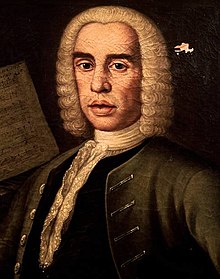Leonardo Leo
Leonardo Leo (* 5 August 1694 (after Piccinni 1701 ) in San Vito degli Schiavoni, today's San Vito dei Normanni , † 31 October 1744 in Naples ) was an Italian composer of the Baroque .
Life
Leonardo Leo studied at the Conservatorio della pietà de 'Turchini in Naples as well as with Giuseppe Ottavio Pitoni in Rome and then lived from 1717 until his death in 1744 (not 1742 or 1743, as Burney and Piccinni indicate) as church conductor and director of the Conservatory of Sant 'Onofrio in his hometown.
As one of the most excellent masters of the Neapolitan School , Leo was excellent in all genres of composition and equally great in the passionate and sublime as in the naive, delicate and jocular. He shared his excellent reputation with his contemporary Francesco Durante . At the time, the supporters of the two divided into two rival camps, the “Leisti” and the “Durantisti”. Leo created more than 500 works, in addition to numerous operas, many church works such as masses, psalms and cantatas, serenades and instrumental works. Most of his work is kept in the library of the Conservatorio di San Pietro a Majella in Naples, in the library of the Vatican and in the British Library in London. Leo's six cello concertos are of particular importance .
Leo has also worked successfully as a teacher; his students included Giovanni Battista Pergolesi , Niccolò Jommelli , Ignazio Fiorillo , Pasquale Cafaro and Niccolò Piccinni .
Works (selection)
Operas (60 in total)
- L'infedeltà abbattuta (1712)
- Sofonisba (1719),
- Diana Amante
- Bajazete imperador de 'turchi (1722)
- Timocrate (1723)
- Zenobia in Palmira (1725)
- Il trionfo di Camilla Regina de 'Volsci (1726, Rome)
- Lo matrimonio annascuso (1727)
- Catone in Utica (1729)
- Il Demetrio (1732)
- Amor vuol sofferenza (1733, Naples)
- La clemenza di Tito (1735)
- Demofoonte (1735)
- L'olimpiade (1737)
- Siface (1737)
- Le nozze di Psiche e Amore , composed for the wedding of King Carlo III. with Maria Amalia Walburga of Saxony.
- Ciro riconosciuto (1739)
- L'Alidoro (1740)
- Issipile (1742)
- Achille in Sciro (around 1743)
- Deceballo (1743)
- Vologeso, re de 'Parti (1744)
Oratorios
- La morte di Abele (1732, performed in Bologna in 1738 and in Modena in 1750)
- Sant'Elena al Calvario (1732; several other performances until 1773)
Church music
- Ave Maria
- Miserere
- Salve Regina
The latter is characterized in particular by the depth of expression as well as by artistic harmonic and contrapuntal work.
Instrumental music
- 6 cello concertos (1737–1738)
- Concerto for 4 violins
- 2 flute concerts
- Toccate on harpsichord
literature
- Leo, 1) Leonardo . In: Meyers Konversations-Lexikon . 4th edition. Volume 10, Verlag des Bibliographisches Institut, Leipzig / Vienna 1885–1892, p. 692.
Web links
- Sheet music and audio files by Leo in the International Music Score Library Project
- Works by and about Leonardo Leo in the catalog of the German National Library
- Search for operas by Leonardo Leo (search term in the Autore field : "Leo Leonardo") in the Corago information system of the University of Bologna
| personal data | |
|---|---|
| SURNAME | Leo, Leonardo |
| BRIEF DESCRIPTION | Italian Baroque composer |
| DATE OF BIRTH | August 5, 1694 or 1701 |
| PLACE OF BIRTH | San Vito dei Normanni |
| DATE OF DEATH | October 31, 1744 |
| Place of death | Naples |
